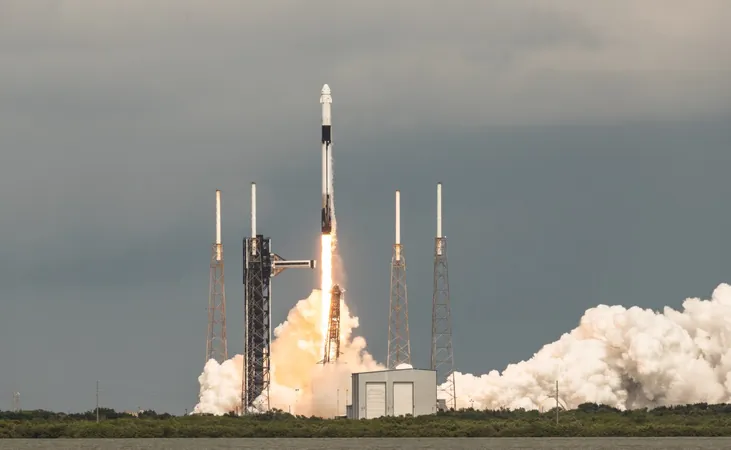
Major Setback for SpaceX: Falcon 9 Grounded After Third Anomaly in Three Months! What Happens Next?
2024-09-30
Author: Ling
SpaceX Faced with Grounded Falcon 9 Rocket
SpaceX is facing a significant hurdle as its Falcon 9 rocket has been grounded once again, following an unexpected incident with its second stage post-launch. During a recent mission that successfully delivered a Dragon capsule to orbit with astronauts aboard, the second stage failed to land in the designated area of the ocean, prompting the company to halt further launches until the cause of this anomaly is thoroughly investigated.
In a statement released on social media platform X (formerly Twitter), SpaceX confirmed, “We will resume launching once we better understand the root cause.” The latest launch, Crew-9, lifted off on Saturday, carrying NASA astronaut Nick Hague and Russian cosmonaut Aleksandr Gorbunov to the International Space Station (ISS). Notably, two seats were left empty on this mission to ensure space for two Boeing Starliner astronauts expected to return in February.
Previous Anomalies and Consequences
While the astronaut deployment went smoothly, this incident marks the third anomaly in merely three months. The deorbit burn, a crucial maneuver utilizing the Merlin Vacuum engine to guide debris to a specific oceanic zone, did not go as planned. Previous anomalies include a liquid oxygen leak during a routine Starlink launch in July, which resulted in the loss of 20 satellites, and an August incident where a booster landed roughly on a SpaceX drone ship, leading to its destruction upon impact.
Resilience and Recovery
Despite these challenges, SpaceX has shown resilience. After quickly addressing the July leak, which was attributed to a cracked line connected to the pressure sensor, the company resumed operations in just two weeks. Moreover, the FAA did not pause launches following the August booster mishap, allowing SpaceX to continue its ambitious flight schedule.
Impact on Upcoming Missions
However, the current grounding poses a risk to several high-stakes upcoming missions. The European Space Agency's Hera mission, set to explore asteroids, is scheduled for October 7, followed closely by NASA's Europa Clipper mission targeting its icy moon on October 10. These missions operate within tight launch windows that close at the end of the month, raising concerns about potential delays.
Looking Ahead: What’s Next for SpaceX?
In light of these issues, industry experts are closely monitoring SpaceX’s next steps. Will the company manage to resolve this latest anomaly swiftly, or could this lead to further setbacks? As we stay tuned for updates, the space community is left wondering about the future of these critical missions and what impact further delays may have on international space collaboration.




 Brasil (PT)
Brasil (PT)
 Canada (EN)
Canada (EN)
 Chile (ES)
Chile (ES)
 España (ES)
España (ES)
 France (FR)
France (FR)
 Hong Kong (EN)
Hong Kong (EN)
 Italia (IT)
Italia (IT)
 日本 (JA)
日本 (JA)
 Magyarország (HU)
Magyarország (HU)
 Norge (NO)
Norge (NO)
 Polska (PL)
Polska (PL)
 Schweiz (DE)
Schweiz (DE)
 Singapore (EN)
Singapore (EN)
 Sverige (SV)
Sverige (SV)
 Suomi (FI)
Suomi (FI)
 Türkiye (TR)
Türkiye (TR)